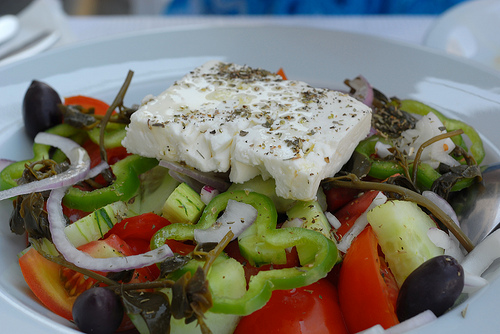Irregular Greek verbs: to eat Posted by Ourania on May 25, 2016 in Grammar
The verb “to eat” (τρώω) is one of the most common and irregular Greek verbs. In this post, there are examples of its conjugation and use. Some types cannot be translated in English.
Ενεργητική Φωνή (Active voice)
Ενεστώτας: τρώω / I eat, I am eating
Τα παιδιά τρώνε πολλά γλυκά. / The children eat many sweets.
Αόριστος: έφαγα / I ate
Χθες φάγαμε μουσακά. / Yesterday we ate mousaka.
Απλός Μέλλοντας: θα φάω / I will eat
Αργότερα θα φάω γιαούρτι. / I will eat yogurt later.
Παρατατικός: έτρωγα / I was eating, I used to eat
Κάθε πρωί έτρωγες φρούτα. / Every morning you used to eat fruit .
Συνεχής Μέλλοντας: θα τρώω / I will be eating
Κάθε μέρα θα τρώμε φρούτα. / Everyday we will be eating fruit.
Παρακείμενος: έχω φάει / I have eaten
Πεινάω. Δεν έχω φάει ακόμα. / I’m hungry. I haven’t eaten yet.
Υπερσυντέλικος: είχα φάει / I had eaten
Δεν είχα φάει τίποτα πριν τις πέντε. / I hadn’t eaten anything before five.
Συντελεσμένος Μέλλοντας: θα έχω φάει / I will have eaten
Θα έχουμε φάει μέχρι τις πέντε. / We will have eaten by five.
Υποτακτική Ενεστώτα: να / ας τρώω / to eat, let’s eat
Δεν πρέπει να τρώνε τόση ζάχαρη. / They shouldn’t eat so much sugar.
Υποτακτική Αορίστου: να / ας φάω / to eat, let’s eat
Ας φάμε την πίτα της Άννας. / Let’s eat Anna’s pie.
Υποτακτική παρακειμένου: να / ας έχω φάει
Πρέπει να έχετε φάει πριν τις οκτώ. / You must have eaten before eight.
Προστακτική Ενεστώτα: τρώγε, τρώτε / eat
Μην παίζεις με το φαγητό σου! Τρώγε! / Don’t play with your food! Eat!
Προστακτική Αορίστου: φάε, φάτε / eat
Γιώργο, φάε γρήγορα! Giorgo, eat quickly!
Μετοχή Ενεστώτα: τρώγοντας / eating
Τρώγοντας έρχεται η όρεξη / Appetite comes with eating
Παθητική φωνή (Passive voice)
Ενεστώτας: τρώγομαι / I am eaten
Αυτό το φαγητό τρώγεται κρύο. / This food is eaten cold.
Αόριστος: φαγώθηκα / I was eaten
Η τούρτα φαγώθηκε αμέσως. / The cake was eaten immediately.
Απλός Μέλλοντας: θα φαγωθώ
Αυτή η τούρτα δε θα φαγωθεί. Δεν είναι καλή. / This cake will not be eaten. It is not good.
Παρατατικός: τρωγόμουν / I was eaten, I used to be eaten
Το φαγητό στο εστιατόριο δεν τρωγόταν. / (Lit) The food in the restaurant was not eaten (was too bad to eat)
Συνεχής Μέλλοντας: θα τρώγομαι / I will be eaten
Η μαρμελάδα θα τρώγεται μόνο από τα παιδιά. / The jam will be eaten only by the children.
Παρακείμενος: έχω φαγωθεί / I have been eaten
Δεν υπάρχει άλλη σαλάτα. Έχει φαγωθεί. / There is no more salad. It has been eaten.
Υπερσυντέλικος: είχα φαγωθεί / I had been eaten
Το παγωτό είχε φαγωθεί πριν το μεσημεριανό. / The ice-cream had been eaten before lunch.
Συντελεσμένος Μέλλοντας: θα έχω φαγωθεί / I will have been eaten
Το παγωτό θα έχει φαγωθεί πριν το μεσημεριανό. / The ice-cream will have been eaten before lunch.
Υποτακτική Ενεστώτα: να τρώγομαι / (must) be eaten
Αυτό το φαγητό πρέπει να τρώγεται ζεστό. / This food must be eaten hot.
Υποτακτική Αορίστου: να φαγωθώ / (must) be eaten
Tο παγωτό πρέπει να φαγωθεί τώρα αλλιώς θα λιώσει. / The ice-cream must be eaten now otherwise it will melt.
Υποτακτική Παρακειμένου: να έχω φαγωθεί / (must) have been eaten
Όλα τα φρούτα πρέπει να έχουν φαγωθεί πριν την επόμενη μέρα. / All the fruits must have been eaten before the following day.
Μετοχή Παρακειμένου: φαγωμένος / eaten
Αυτό το μήλο είναι μισοφαγωμένο. This apple is half eaten.

Build vocabulary, practice pronunciation, and more with Transparent Language Online. Available anytime, anywhere, on any device.
About the Author: Ourania
Ourania lives in Athens. She holds a degree in French Literature and a Master’s degree in Special Education for Children. Since 2008, she has been teaching Greek to foreigners.






Comments:
Neal:
Nice blog post about not only τρώω, but the examples for active vs. passive are very helpful to put it into context and help the student understand those differences, especially if some might not have a strong background in grammar.
By the way: “This cake will net be eaten” – I noticed a typo here, “net” should be “not”.
Ourania:
@Neal Ευχαριστω, Neal! I will correct the typo.